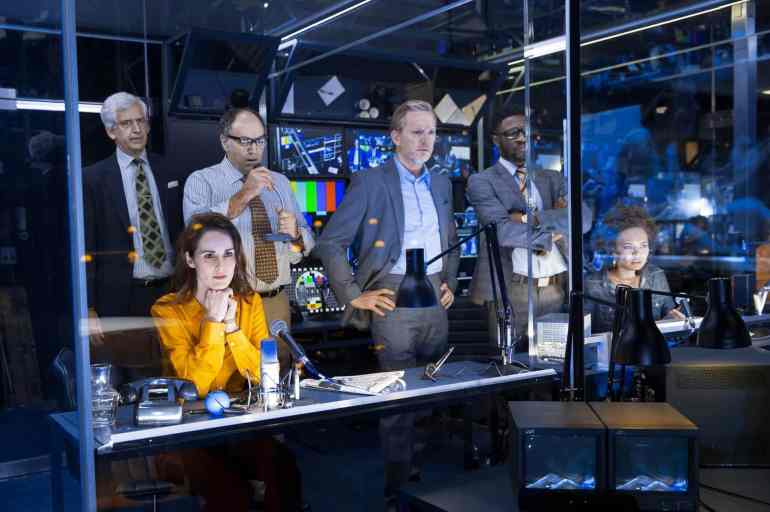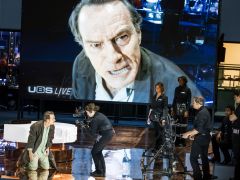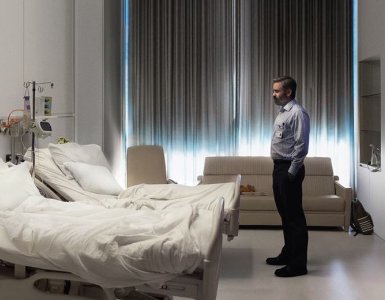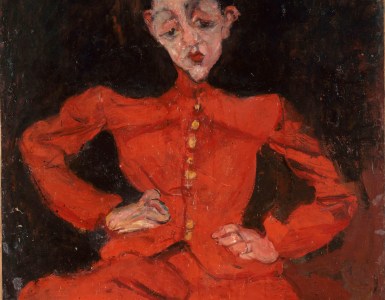Adapting the 1976 satirical film of the same name, Network follows TV newsreader Howard Beale, whose bosses discover that his increasingly unhinged on-air rants may hold the key to their ratings success.
Lee Hall’s adaptation expertly blends on-stage action with both live and pre-recorded video. The mechanism is exploited to its logical extreme - taken even further than Andrew Scott’s Hamlet earlier this year, itself credited with creative use of video.
The normal rules of blocking are deliberately broken, apparently in the presumption that with nowhere obvious to look, the audience’s eyes will default back to a honking great screen in the centre of the stage. It’s not entirely successful. There are moments, especially in the first half, where your eyes get lost and you spend precious moments working out where the dialogue you’re hearing is coming from.
Despite sometimes verging into showiness, the camera trickery isn’t a pointless add-on. For instance, it’s used twice, in different ways, to successfully sell the audience on a character’s out-of-body experience.

Bryan Cranston delights as “prophet of the airwaves” Howard Beale, bringing gravity and authenticity to a role that could easily come off as a melodramatic know-it-all in the wrong actor’s hands.
He’s truly as home delivering Howard’s famous “mad as hell” speech, but despite that, we never really only really get a sense of Howard as a human being. For such a powerhouse role, he gets surprisingly little opportunity to interact with other characters. Most of his talking is direct to the audience.
Bryan Cranston brings gravity and authenticity to “prophet of the airwaves” Howard Beale.
Fleeting interactions with his best friend and sometime boss Max Schumacher are the closest we get to knowing the “real” Howard, but these are too rare for us to really understand what’s supposed to be going on in Howard’s head, or why he does what he does.
Douglas Henshall as Max Schumacher, and Michelle Dockery as the ratings-chasing exec Diana Christensen delight while apart, but have little in the way of chemistry and offer some of the cringiest relationship dialogue this side of the invention of Twitter.
The frantic preparations before each episode of Howard’s TV show airs are some of the tensest scenes I’ve ever seen on a stage, due in no small part to the musical talents of the BL!NDMAN quartet, looming over the centre stage as if commanding the actors below.
Network desperately wants to be up-to-date - to be seen telling harsh truths to millenials. It’s a point driven home by the inclusion of presidential inauguration footage leading up to the present day in the play’s coda.
But despite that effort, it remains what is essentially a period piece. It may be clear now that social media is largely a force for ill in the world, but simply transplanting 1975’s cultural woes about television to the present day and hoping we can’t tell the difference is a big ask.
Network desperately wants to be up-to-date - to be seen telling harsh truths to millenials.
How should we read Howard Beale’s speeches nowadays, with their pleas to turn off the TV set and just live life? Strident, messianic and played absolutely straight when they were written, what are we to make of them in 2018?
With the cultural knowledge of the intervening forty years, can we be forgiven for considering them a little two-dimensional? Virtually no one nowadays is surprised to discover that the media serves as much to shock as it does to educate.
If any one idea in Network remains germaine today, it is that the medium is *not* the message. Television is just a temporary way of expressing the emotions, neuroses and concerned that already exist inside us.
Who knows how we’ll look back on social media in forty years?









Add comment